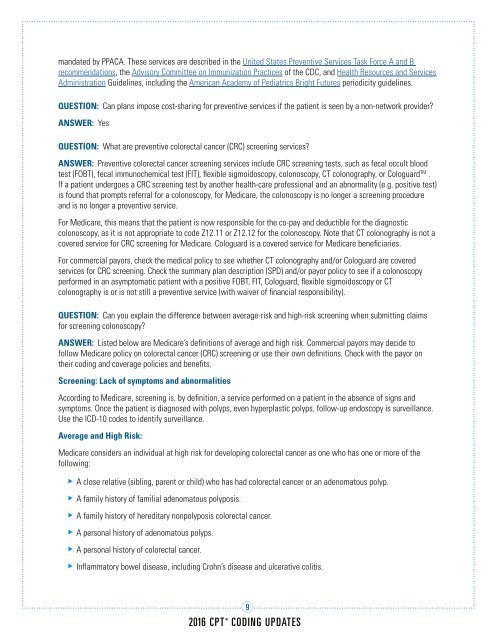GASTROENTEROLOGY CPT ADVISORS
IkBHjH
IkBHjH
Create successful ePaper yourself
Turn your PDF publications into a flip-book with our unique Google optimized e-Paper software.
mandated by PPACA. These services are described in the United States Preventive Services Task Force A and B<br />
recommendations, the Advisory Committee on Immunization Practices of the CDC, and Health Resources and Services<br />
Administration Guidelines, including the American Academy of Pediatrics Bright Futures periodicity guidelines.<br />
QUESTION: Can plans impose cost-sharing for preventive services if the patient is seen by a non-network provider?<br />
ANSWER: Yes<br />
QUESTION: What are preventive colorectal cancer (CRC) screening services?<br />
ANSWER: Preventive colorectal cancer screening services include CRC screening tests, such as fecal occult blood<br />
test (FOBT), fecal immunochemical test (FIT), flexible sigmoidoscopy, colonoscopy, CT colonography, or Cologuard TM .<br />
If a patient undergoes a CRC screening test by another health-care professional and an abnormality (e.g. positive test)<br />
is found that prompts referral for a colonoscopy, for Medicare, the colonoscopy is no longer a screening procedure<br />
and is no longer a preventive service.<br />
For Medicare, this means that the patient is now responsible for the co-pay and deductible for the diagnostic<br />
colonoscopy, as it is not appropriate to code Z12.11 or Z12.12 for the colonoscopy. Note that CT colonography is not a<br />
covered service for CRC screening for Medicare. Cologuard is a covered service for Medicare beneficiaries.<br />
For commercial payors, check the medical policy to see whether CT colonography and/or Cologuard are covered<br />
services for CRC screening. Check the summary plan description (SPD) and/or payor policy to see if a colonoscopy<br />
performed in an asymptomatic patient with a positive FOBT, FIT, Cologuard, flexible sigmoidoscopy or CT<br />
colonography is or is not still a preventive service (with waiver of financial responsibility).<br />
QUESTION: Can you explain the difference between average-risk and high-risk screening when submitting claims<br />
for screening colonoscopy?<br />
ANSWER: Listed below are Medicare’s definitions of average and high risk. Commercial payors may decide to<br />
follow Medicare policy on colorectal cancer (CRC) screening or use their own definitions. Check with the payor on<br />
their coding and coverage policies and benefits.<br />
Screening: Lack of symptoms and abnormalities<br />
According to Medicare, screening is, by definition, a service performed on a patient in the absence of signs and<br />
symptoms. Once the patient is diagnosed with polyps, even hyperplastic polyps, follow-up endoscopy is surveillance.<br />
Use the ICD-10 codes to identify surveillance.<br />
Average and High Risk:<br />
Medicare considers an individual at high risk for developing colorectal cancer as one who has one or more of the<br />
following:<br />
X XA close relative (sibling, parent or child) who has had colorectal cancer or an adenomatous polyp.<br />
X XA family history of familial adenomatous polyposis.<br />
X XA family history of hereditary nonpolyposis colorectal cancer.<br />
X XA personal history of adenomatous polyps.<br />
X XA personal history of colorectal cancer.<br />
X XInflammatory bowel disease, including Crohn’s disease and ulcerative colitis.<br />
9<br />
2016 <strong>CPT</strong> ® CODING UPDATES




